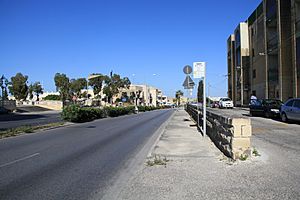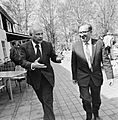Dom Mintoff facts for kids
Quick facts for kids
Dom Mintoff
|
|
|---|---|
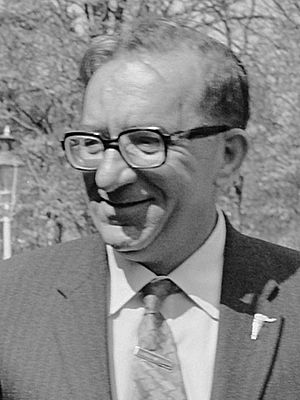
Mintoff in 1974
|
|
| 8th Prime Minister of Malta | |
| In office 21 June 1971 – 22 December 1984 |
|
| Monarch | Elizabeth II |
| President | Anthony Mamo Anton Buttigieg Albert Hyzler (Acting) Agatha Barbara |
| Governor-General | Maurice Henry Dorman Anthony Mamo |
| Preceded by | Giorgio Borg Olivier |
| Succeeded by | Karmenu Mifsud Bonnici |
| In office 11 March 1955 – 26 April 1958 |
|
| Monarch | Elizabeth II |
| Governor | Robert Laycock |
| Preceded by | Giorgio Borg Olivier |
| Succeeded by | George Borg Olivier (1962) |
| 4th Leader of the Malta Labour Party | |
| In office 16 October 1949 – 22 December 1984 |
|
| Preceded by | Paul Boffa |
| Succeeded by | Karmenu Mifsud Bonnici |
| Personal details | |
| Born | 6 August 1916 Bormla, Crown Colony of Malta (now Cospicua, Malta) |
| Died | 20 August 2012 (aged 96) Tarxien, Malta |
| Resting place | Addolorata Cemetery |
| Political party | Labour Party |
| Spouse |
Moyra de Vere Bentinck
(m. 1947; died 1997) |
| Children |
|
| Residences | Bormla, Tarxien |
| Education | De La Salle College (Malta) Archbishop's Seminary |
| Alma mater | University of Malta B.Sc, B.E. & A. Hertford College M.A. (Oxon) |
| Occupation | Politician, architect, civil engineer |
| Awards | Rhodes Scholarship Al-Gaddafi International Prize for Human Rights |
| Website | http://duminkumintoff.com |
Dominic Mintoff (born August 6, 1916 – died August 20, 2012) was an important Maltese politician. People often called him il-Perit, which means "the Architect" in Maltese. He led the Labour Party for many years, from 1949 to 1984.
Mintoff served as the Prime Minister of Malta twice. His first time was from 1955 to 1958, when Malta was still under British rule. After Malta became independent, he was Prime Minister again from 1971 to 1984. During his time as leader, Malta saw many changes. He helped create a system where the government provided many social benefits, like help for families and better healthcare. He also oversaw the creation of the Maltese republic. However, his later years in office were marked by economic challenges and political disagreements.
Contents
Dom Mintoff's Early Life and Education
Dominic Mintoff was born on August 6, 1916, in Bormla (now Cospicua), Malta. He was the third child in his family and the oldest boy among nine siblings. His father worked as a cook for the British Royal Navy.
Dom Mintoff went to a seminary, which is a school for people who want to become priests, but he decided not to join the priesthood. Instead, he went to the University of Malta. He studied hard and became an architect and a civil engineer in 1937. That same year, he won a special scholarship called the Rhodes Scholarship. This allowed him to continue his studies at Hertford College, Oxford in England, where he earned a Master's degree in Science and Engineering in 1939.
Mintoff's Political Journey
Starting in Politics (1935–1949)
After finishing his studies, Mintoff quickly became involved in politics. He served as the Secretary General of the Labour Party from 1935 to 1945. In 1945, he was elected to the Government Council, which was an important step in his political career. He also became the Deputy Leader of the Labour Party, showing that he was a strong future leader.
When the Labour Party won the elections in 1947, Mintoff became the Deputy Prime Minister. He was also in charge of Public Works and Reconstruction. This meant he helped manage big building projects after World War II.
Leading the Labour Party (1949–1984)
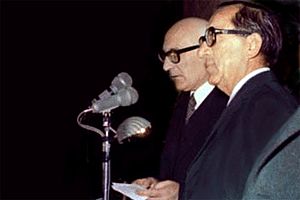
Mintoff's strong ideas and ambition sometimes caused disagreements within the government. Eventually, there was a split in the Labour Party. The leader at the time, Paul Boffa, resigned. Mintoff then became the leader of the "Malta Labour Party."
It took some time for the Labour Party to win elections again. In 1955, Mintoff became Prime Minister for the first time. During this period, he suggested that Malta should become more closely connected with the United Kingdom. This idea caused problems with the Catholic Church in Malta, which led to a difficult period for the Labour Party. The party lost the next two elections in 1962 and 1966. They even boycotted the Independence celebrations in 1964 because they disagreed with some parts of the independence agreements.
Relations with the Catholic Church improved in 1969. Then, in 1971, Dom Mintoff was elected Prime Minister again. He immediately started to change the agreements Malta had with the United Kingdom regarding military bases and money.
His government also introduced many new programs. They took control of large companies to help the country's economy and expanded government services. They also focused on creating jobs and improving the welfare state, which provides social benefits to citizens. New laws were passed to ensure equal pay for men and women. Also, civil (non-religious) marriage was introduced.
In 1974, Malta officially became a republic, which meant it no longer had the British Queen as its head of state. In 1979, the last British troops left Malta, marking the end of a long British military presence.
The Labour Party won the elections again in 1976. In 1981, there were disagreements about the election results. Even though the opposition party received more votes, the Labour Party won more seats in parliament. This led to a political crisis, and the opposition members refused to take their seats for a while. Mintoff stayed as Prime Minister until 1984. He then resigned at the age of 68, and his deputy, Karmenu Mifsud Bonnici, took over.
After Being Prime Minister (1984–1998)
After resigning as Prime Minister and party leader in 1984, Mintoff remained a member of parliament. He played a key role in making changes to the Maltese constitution. These changes helped ensure that the party with the most votes would also get the most seats in parliament. This helped avoid a repeat of the 1981 election situation.
The Labour Party lost the 1987 elections and became the opposition party after 16 years in power. Mintoff continued to be elected in 1992 and 1996. However, he started to have disagreements with the new Labour leader, Alfred Sant. This led to a major moment in 1998 when Mintoff voted against his own party's government on an important issue. This vote caused the government to fall, and new elections were called. This was the first time in many years that Mintoff's name was not on the ballot, and the Labour Party lost the election.
Malta's Place in the World
After his first time as Prime Minister, Mintoff became a strong supporter of countries gaining independence from colonial rule. When he returned to office in 1971, he focused on renegotiating Malta's defense agreements with Britain.
He also worked to make Malta a neutral country, meaning it would not take sides in major international conflicts like the Cold War. He built relationships with leaders from various countries, including China, North Korea, Romania, and Libya. He wanted Malta to have good relationships with countries from all over the world, especially those not aligned with the major powers.
Life After Politics (1998–2012)
After leaving parliament, Mintoff was not as active in public life. He made a few appearances during the campaign for Malta to join the European Union in 2003. Later, when a new leader took over the Labour Party in 2008, his relationship with the party improved.
Family Life
On November 22, 1947, Dom Mintoff married Moyra de Vere Bentinck. They met while he was studying in Oxford. The couple had two daughters, Anne and Yana.
His Passing
Dom Mintoff was taken to the hospital in July 2012. He was discharged shortly before his 96th birthday and passed away at home on August 20, 2012. The government of Malta held a state funeral for him on August 25.
Mintoff's Impact on Malta
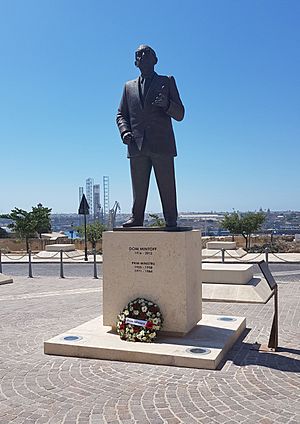
Many people remember Dom Mintoff for introducing important social benefits in Malta. These include things like children's allowance, pensions for retired workers, a minimum wage, and social housing. He also helped create national companies like Air Malta (the national airline) and Sea Malta (a shipping company). He played a big part in separating the church and the state and ending 200 years of British colonial rule.
However, some people also point to the challenges and disagreements that happened during his time in office. Despite this, Mintoff's impact on Malta is very clear. He was the longest-serving Prime Minister in Maltese history. He guided Malta from being a British colony to an independent republic. The way Malta's laws and society are structured today was largely shaped during his time as leader.
Mintoff was key in developing Malta's constitution and its foreign policy. He made sure Malta was part of the Non-Aligned Movement, focusing on good relations with many countries. The modern system of nationalized healthcare and the public housing system in Malta were also created under his leadership. He also supported teaching the Maltese language more in schools, which helped revive it.
Many places in Malta are named after him. In 2013, a square in Bir id-Deheb, Żejtun, was renamed Dom Mintoff Square. A statue of him was unveiled in his hometown of Cospicua in 2014. Another statue was put up in Castille Square in Valletta in 2018, right across from the Prime Minister's office. Roads in Paola, Bormla, and Marsa have also been renamed in his honor. In 2019, a garden in Paola was renamed Dom Mintoff Garden.
Awards and Honours
National Honours
 Companion of Honour of the National Order of Merit (1990)
Companion of Honour of the National Order of Merit (1990) Malta Self-Government Re-introduction Seventy-Fifth Anniversary Medal (1996)
Malta Self-Government Re-introduction Seventy-Fifth Anniversary Medal (1996) Malta Independence Fiftieth Anniversary Medal (2014) (awarded after his death)
Malta Independence Fiftieth Anniversary Medal (2014) (awarded after his death)
Foreign Honours
 Order of the Republic of Libya (1971)
Order of the Republic of Libya (1971) Grand Cordon of the Order of the Republic of Tunisia (1973)
Grand Cordon of the Order of the Republic of Tunisia (1973) Grand Cordon of the Order of Ouissam Alaouite (1978)
Grand Cordon of the Order of Ouissam Alaouite (1978)- Al-Gaddafi International Prize for Human Rights (2008)
Images for kids
-
Mintoff with Dutch premier Joop den Uyl in the Hague in 1974
See also
 In Spanish: Dom Mintoff para niños
In Spanish: Dom Mintoff para niños
 | Claudette Colvin |
 | Myrlie Evers-Williams |
 | Alberta Odell Jones |


